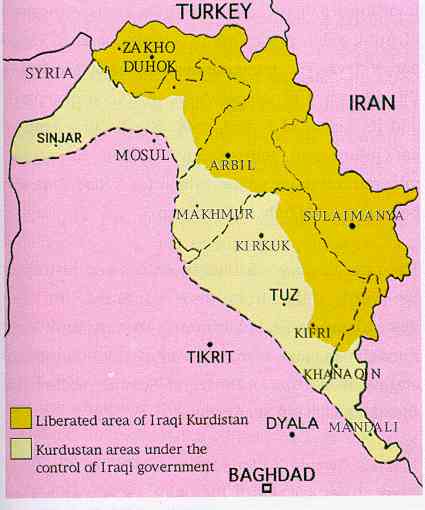
IRAQI KURDISTAN REGION
By Iraqi Kurdistan Region, we mean the southern part of Kurdistan attached to Iraq
according to an agreement between Britain. And Turkey and hence the area referred to as
the; northern part of
Iraq.
The area of Iraqi Kurdistan is about 80.000 sq. km, and thus
it forms 18% of the total area of Iraq, (about 435.000 sq. km). The Kurdish population in
Iraq is more than 6 million, about 2/3 inhabiting the three governorates of Arbil,
Sulaimanya, Dohuk, in parts of both Kirkuk and Nineva governorates. This area which
constitutes more than half of the total area of Iraqi Kurdistan are now under the control
of the Kurdistan Regional Government. The remaining population inhabits the area under the
control of Iraqi governmet.

These people are part of a nation whose population exceeds 30 million
living within a geographic location in the Middle East that exceeds 500.000 sq. km.
Divided among more than four countries; Iraq, Syria, Turkey, and Iran, the Kurds are
deprived of the simplestfnational, cultural, and native rights.
The Kurds, particularly those, who live in the part attached to Iraq,
are constantly subjected to the worst kinds of suppression and hence they have been in
continuous rebellion in defense of their national legitimate rights. The beginning; 0f
this century witnessed the movement of Sheik Abdul-Salam Barzani, in the twenties and
thirties of this century witnessed the revolts of Sheikh Mahmood Al-Hafeed, and of Sheikh
Ahmad Barzani following which the struggle was pursued by Mustafa
Barzani in the forties, who found Kurdistan Democratic Party and led September
Revolution in 1961 which lasted until 1975. This Revolution was the greatest Kurdish
revolution and the most conclusive in the history of the Kurds, which ended as a result of
the treasonous Algeria’s agreement between Iraq and Iran. Nevertheless the Kurdish
revolt flared up again in 1976 in the mountains and valleys of Kurdistan defying
deportation campaigns, Arabization and terrorism, and for years, especially in the
eighties, the Kurdish people were subjected to brutal military campaigns and genocidal
operations by chemical and biological weapons and the ill-famed Anfal
operations. More than 4500 village and town were looted and burned by the bloody hands
of the regime of Saddam Hussein, and to date the fate of more than 180 000 Kurdistani
citizens remains unknown.

Consequent to Iraq's invasion of Kuwait, and the outbreak of the Second
Gulf War, a popular uprising in the Iraqi Kurdistan flared up in March
1991. The Kurdistan Front comprising a coalition of eight parties; Kurdistan
Democratic Party (KDP), Patriotic Union of Kurdistan (PUK), Iraqi Communist party (ICP),
Kurdistan Democratic Popular Party (KDPP), Kurdistan Toilers Party (KTP), Kurdistan Social
Party (KSP), Kurdish Social Party (KSP) and Assyrian Democratic Movement (ADM), controlled
a wide area of the region and established its authority in it, but the Iraqi government
restored the authority again over a large part of the liberated areas due to the
permissive attitude of the coalition forces, and thus pushing millions to seek refuge in
the neighboring countries of Iran and Turkey, escaping the operations of suppression and
revenge. After the Iraqi government troops
See Picture on
Halabja, 1988
were stopped by the resistance shown by the peshmarga of Kurdistan, and
when the region was declared a safe haven, the people returned to their homes and the KF
returned to exercise its authority in the area. Upon invitation by the central government
in Baghdad, KF entered negotiations at the end of spring 1991, but the regime did not
respond to the rights of the Kurdish people. Later, the central government of Iraq
withdrew its official administration from the region in order to create an administrative
and legislative vacuum hoping to disrupt the administrative situation in the region and
paralyze service institutions, an act that urged KF to adopt the decision of holding
general elections and organize the governmental administrations and service
institutions that could fill in the vacuum created by the withdrawal of Iraqi governmental
administration.
Thus, general elections were held on June 19th 1992, and the Iraqi
Kurdistan National Assembly came into being, in accordance with an "
ad
hoc enacted law, and Consequent to this the Kurdish regional
government was formed and judiciary was reorganized in the region.


